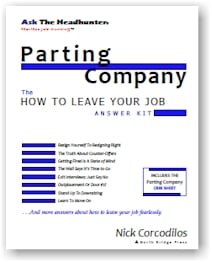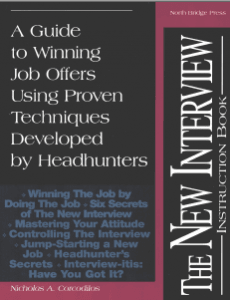In the September 1, 2015 Ask The Headhunter Newsletter, a reader trusts a recruiter and winds up regretting it.
Question
I was hired as an executive assistant at a very large, global company. The recruiter (who worked for the company) assured me that the benefits were very good, “comparable to any big company,” and insisted that they were on par
with any other organization I’ve worked with.
It turns out they aren’t. I pay half of my health insurance (approximately $750/month), my vacation is mandated in December because of annual office closure, no overtime is offered, I work one scheduled weekend per month unpaid, and my significant other was not covered under benefits (though a same-sex partner would have been) until we are married.
The recruiter quit her job shortly after I was hired. I haven’t brought up these issues with the company, although I’ve been here almost a year. The culture is very much that one should not complain because you should be happy you have a job.
I took a 25% pay cut for this gig. Do I have any legal recourse? I fear that the legal costs would outweigh any benefits. In the meantime, I’m looking for a new job elsewhere but have found that my “new” salary requirements have me in a different bracket.
Nick’s Reply
You got sucker-punched because you didn’t see it coming. I doubt you have any legal recourse, but I’m not a lawyer and this isn’t legal advice. You could start by talking with your state’s department of labor and employment — they may be able to advise you, and they may have other complaints on record about this employer.
It seems the recruiter baited you. See Why do companies hide the benefits? Too often, job applicants trust what is stated orally in an interview without insisting that the commitment be reproduced in writing in the job offer. It amazes me that an applicant will read an offer letter carefully — but never ask for the written benefits. The benefits are part of the offer. I urge you and all of our readers: Get the entire offer in writing and read all components of the offer carefully before you accept!
You must state your position to an employer clearly.
How to Say It
“I’m impressed with your company, and I’m eager to come to work with you. However, I cannot accept this offer without knowing all the terms of employment, including the benefits. I could no more sign an employment agreement without knowing all the terms than your company could sign a business contract without knowing what it was committing to. I’m sure you understand. Could you please provide me with your employee manual, benefits package, and any other documents that would bind me after I start the job? Once I have these, I will promptly respond. I look forward to accepting your offer, and to making a significant contribution to your business. I hope I can count on your help so we can all get to work.”
What a recruiter tells you is akin to what a salesman tells you — it’s intended to close the deal. Good luck collecting on the oral promises later.
I agree that your most important next action is to start a very active job search. The solution to getting stuck applying for jobs with lower salaries is to not disclose your salary — apply for jobs that can pay what you’re worth, and politely but firmly decline to disclose your salary history. Employers have no right to it. You must also be ready to demonstrate why you’re worth more than your current job pays. Two of my PDF books cover these topics: Keep Your Salary Under Wraps and How Can I Change Careers?
Start with your state’s labor office. Get their advice on the details of your situation. But I think that, unfortunately, when you accepted this job you accepted terms you did not understand clearly — because the employer misrepresented them. Please check this article for tips about how to avoid a lower salary at your next job: How do I prove I deserve a higher job offer?
I wish you the best. This kind of slimy behavior by employers is indefensible.
Have you ever accepted a bait-and-switch job offer? What did you do? How would you advise the reader in this week’s Q&A?
: :















